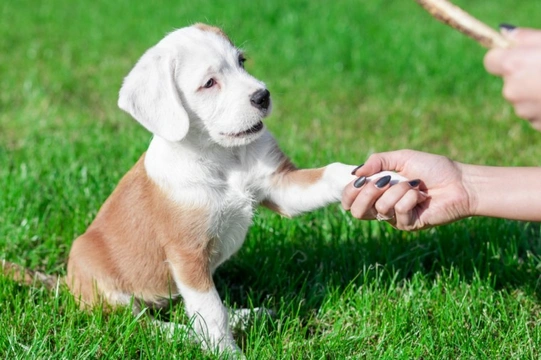
Six tips to help you to keep your cool when house training your puppy
House training, potty training or toilet training – whatever you call it in your own household, teaching your puppy to ask to go outside to do their business and ensuring that they do this reliably is a vital part of puppy ownership, but something that can be challenging for many pups and owners.
Whilst some dog owners are lucky enough to get a really smart pup that has already gotten to grips with house training before they even leave their breeder, or that takes to house training within a couple of weeks, most of us have to dedicate rather longer to getting things right, and clean up the odd mess along the way!
One really important facet of house training a puppy is keeping your cool. Getting angry, telling your puppy off, or even being tense and deliberately holding your anger in because of accidents can actually compromise your success, as well as upsetting or even scaring your puppy.
However, if your pup simply doesn’t seem to be getting the hang of things, or was initially doing well but now seems to be un-learning everything they knew, this can be hugely frustrating for any owner.
With this in mind, this article will share six tips to help any puppy owner keep their cool when it comes to house training, and that can help to make things easier along the way. Read on to learn more.
Contain your puppy to one area whilst their responses are unreliable
First of all, if your pup is making a mess all over the house, this is certainly something you can control even if your pup hasn’t gotten to grips with doing their business outside yet.
Outside of times when you are able to supervise your puppy directly, contain them within one room or area; such as the kitchen, utility room, or another area that is more likely to have easy-clean flooring. Using a baby gate will usually achieve this, and always remember that your pup should have a bed, toys, and water in this room, and should not be left alone for too long at a time.
Learn if your pup’s breed sometimes finds house training particularly challenging
Some dog breeds are widely considered by a lot of their owners to be harder than most others to house train, or are apt to take longer to do so. This will often be dog breeds that are on the lower end of the canine intelligence spectrum, which makes sense, but such correlations aren’t always valid; for instance, small dogs will be less able to hold their small bladders than large ones, and so may be more prone to accidents.
The beagle is one breed that is considered by many to be a challenge to housetrain; and things like this are good things to find out before you commit to buying such a dog!
Knowing such shortcomings in advance can be helpful, but even if you find them out after the fact, there is value in this too; because it helps you to understand that it is not so much that you’re necessarily doing something wrong, but just a case of your breed taking longer than others.
You might also then be able to talk to other owners of dogs of the breed and ask their advice and see how they handled things too!
Learn to predict when your pup is likely to need to do their business
Puppies tend to toilet frequently, as they have yet to learn how and why to hang on if they need to. However, they are also fairly reliable in terms of when you can reasonably expect that they might need the toilet too!
Within half an hour of eating is a natural time to need to potty, and if your pup has drunk a lot, or hasn’t asked to go out for some time are likely times as well. When your pup gets up in the morning is another obvious one!
Be scrupulous about cleaning up messes
Clean up any mess promptly and very thoroughly, as dogs have very sensitive senses of smell, and will detect traces of their own waste long after the smell has faded for us humans.
This smell might indicate to them that the area in question is the place to do their business next time, so eradicating all trace can help to prevent this.
Another tip is to avoid using strongly scented cleaning products or anything fragranced for clean-ups, as such smells can be unpleasant for dogs and may cause them to try to mask it, much as male dogs like to pee where other dogs have gone before!
Understand and appreciate what your pup is capable of
You need to manage your expectations when it comes to what your pup is capable of; whilst a medium sized or large pup approaching their first birthday will generally be able to wait a couple of hours between bathroom breaks, a younger or smaller pup may well not be physically able to.
If you expect too much of your pup, your house training will never succeed – so take care that you’re not being overly optimistic about your pup’s physical capabilities.
Always respond immediately if your pup gives you a cue
Finally, it takes a while for many puppies for house training to sink in, and as is the case for most things dogs learn, they will need multiple repetitions and reinforcements of their behaviour before it becomes instinctive.
This means that if your pup is just beginning to learn that when they ask to go outside, you let them out and then praise them and then you consequently ignore a request or don’t move fast enough, you can undo all of your past work in an instant.
Always respond right away if your pup gives you a cue, and never ignore or delay a request to go outside.



